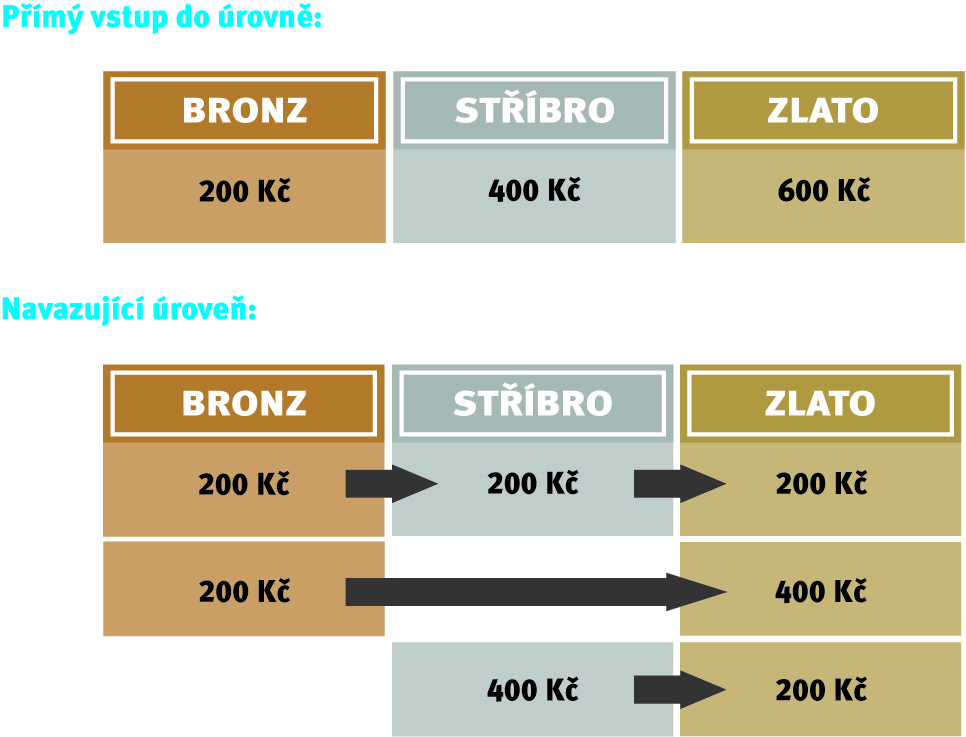Dear leaders,
in the framework of improving the quality and accessibility of the DOFE programme there will be a change in the fees for DOFE and training participants from 1 September 2020.
Participation fees
We have decided to change the participation fees mainly because of the expansion of DOFE activities and the constant moving forward of the programme, which is associated with higher costs for the National Centre. As you know, we are working on the gradual digitization of the program, planning the development of ORB, providing full support to our participants during ceremonies, creating online videos and methodological materials, inventing new ways of recruitment events, and more. At the same time, we hope that in this way we will motivate participants to continue to the next levels and make DOFE a challenge for them.
In case the participants pass all levels, the amount of the fee will not change - the fee will always increase by 200 CZK. In case of passing all levels of the program, the original amount will be reduced to 200 CZK for each subsequent level. The fees for participation will therefore be distributed as follows:
The participant will therefore pay a maximum of 600 CZK for all levels.
Participants will now pay CZK 1 per day for the minimum duration of the program level.
DOFE online - shipping prices
The National DOFE Centre provides training and expedition for participants of the DOFE online programme. The fee for an expedition organised by the National Centre includes expedition training, professional supervision, expedition trainer and evaluator, accident insurance and assistance with assembling an expedition team.
Bronze expedition costs 1000 CZK, silver 1 500 CZK and gold 1 800 CZK.
What about participants who cannot financially afford the program?
DOFE's goal is to enable every young person between the ages of 13-24 to participate in the programme. We realize that the fee may be limiting for some participants, so we have redesigned the system waiving fees for participants who need it. Fees are automatically waived for all participants from orphanages and educational institutions. After consultation with the regional manager, the fee can also be waived for disadvantaged and socially vulnerable participants.
Fees for training
The fees for training will now be CZK 600. The increase follows significant changes to training since the start of 2020. We firmly believe that these changes will help leaders lead DOFE and their Local Centres more effectively. The training is also being significantly modernised and digitised, we have now launched an e-learning platform which will introduce the participant to DOFE and in addition they can return to the materials at any time to refresh the rules and methods of how to work with young people. The National Centre has also created an updated and actionable physical training manual that every participant will receive. We are also continuously creating instructional videos for volunteers on topics such as ORB, expeditions, etc.
New training is expanded to include universal knowledge and training in the skills needed to work with people: communication skills, mentoring skills, introduction to motivation work, focus on well-being and psychohygiene of DOFE volunteers. At the same time, there has been an expansion of areas that relate directly to DOFE: for example, effective management of DOFE Local Centres leading to less administrative burden and more time for participants, or expanded expedition training. The cost of the training continues to include a common lunch and small all-day refreshments for participants.
DOFE has one of the most sophisticated trainings in the field of youth worknot only in non-formal education. Last year's experience with the Erasmus+ programme contributed to this, thanks to which we gained new experience, which we are now applying in the development of training. The training is universal, applicable to any work with young people within an educational institution. In addition, since this year we have a new accreditation from the Ministry of Education, which makes the training still recognizable as further education for teaching staff.



